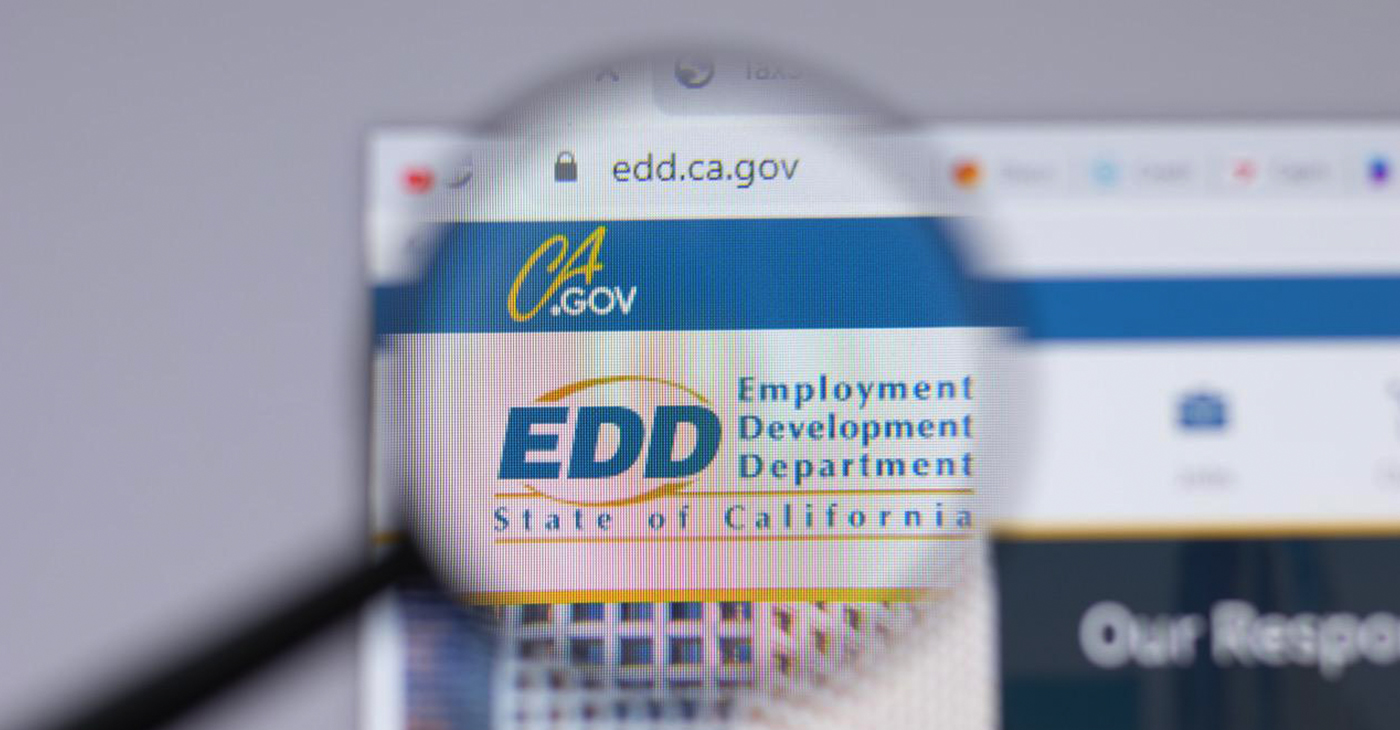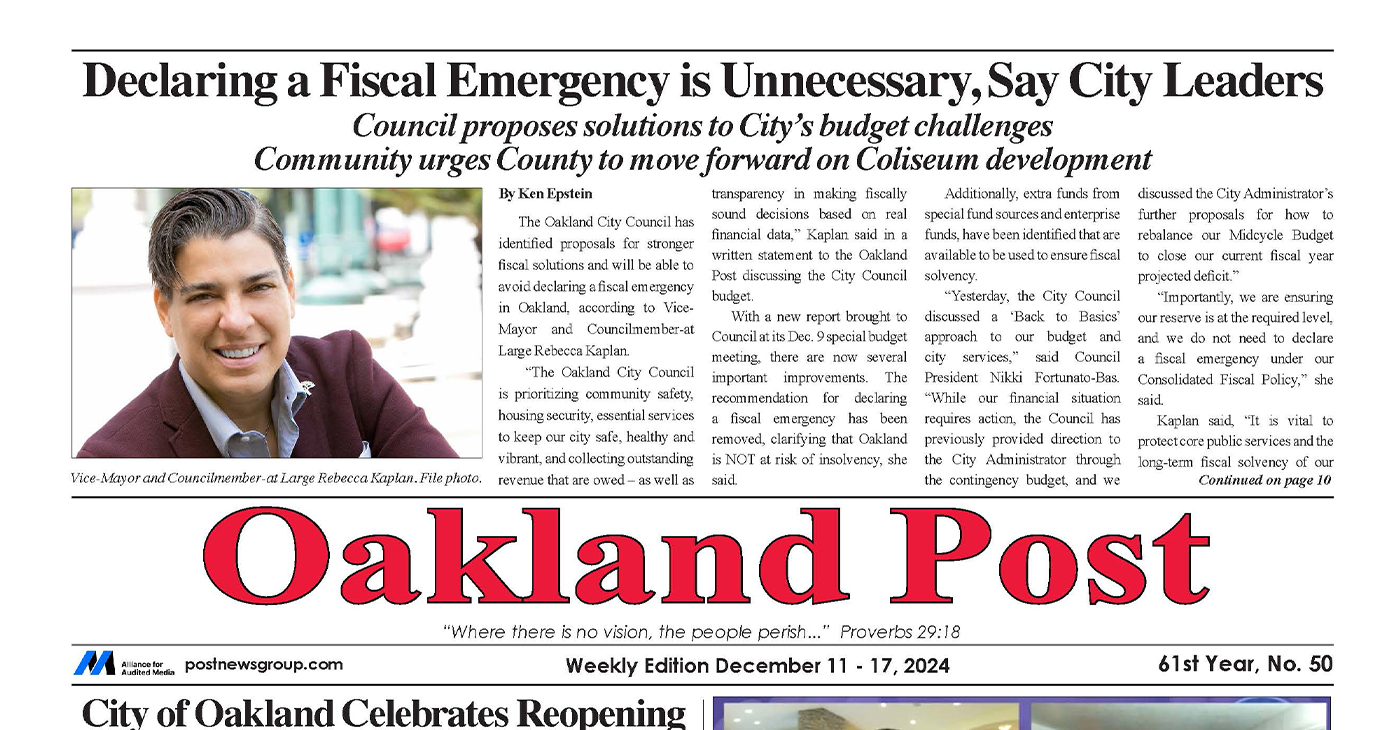Business
State’s Unemployment Dept. Urged to Focus More on Workers’ Claims, Less on Fraud Report Recommendation to Cal EDD: Focus Less on Fraud, More on Employees
“There’s no ongoing relationship between workers and EDD in the same way that there is with business and EDD,” said report author Chas Alamo, LAO’s principal fiscal and policy analyst. “We think this partnership or orientation towards the business community has sort of encouraged the state and the department to prioritize policies that would tend to favor minimizing business costs and eliminating fraud rather than prioritizing getting benefits to workers.”

By Edward Henderson, California Black Media
A new report by California’s Legislative Analysist Office (LAO) offers recommendations for the state’s Employment Development Department (EDD) to improve their functionality and timeliness of their Unemployment Insurance (UI) Program.
The UI program provides temporary wage replacement to unemployed workers to help alleviate their economic challenges and bolster the state economy during downturns.
The increased volume of unemployment claims (both valid and fraudulent) and challenges out-of-work people faced caused by the pandemic highlighted the need to rebalance the program.
Lengthy review processes and holds on valid claims caused hardship for workers and their families, hindered the state’s economic recovery, and spurred frustration among unemployed Californians with their government.
During the COVID-19 pandemic, EDD delayed payments to nearly 5 million workers and improperly denied payments to an estimated 1 million people.
Report author Chas Alamo, LAO’s principal fiscal and policy analyst, links the UI program’s issues to its basic design which hasn’t changed much since the 1930s.
UI benefits are funded by employers. Over time, this has created a relationship with the EDD that employees don’t have. While an employee may apply for benefits once or twice during their entire career, employers have become the EDD’s primary customer because they’re interacting with them on a consistent basis.
“There’s no ongoing relationship between workers and EDD in the same way that there is with business and EDD,” said Alamo. “We think this partnership or orientation towards the business community has sort of encouraged the state and the department to prioritize policies that would tend to favor minimizing business costs and eliminating fraud rather than prioritizing getting benefits to workers.”
The LAO’s report features 12 targeted changes for the EDD to make to improve their operations and relationships with employees seeking benefits. The changes acknowledged unemployment workers experience in three key areas:
- Improper Claim Denials Were Numerous
More than half of the UI claims the EDD denies are overturned on appeal. Overturned denials cause lengthy delays for workers who appeal and raise concern that the state denies many eligible workers. Likely between $500 million and $1 billion in UI payments annually go unpaid each year due to improper denials.
- Claim Delays Need to be Reduced
More than half of UI claims were delayed during the peak of the pandemic, for many workers by several months. Between 15% and 20% of workers who apply for UI during normal economic times experience delays.
- The UI Application Needs to be Simplified
The state’s UI application and ongoing requirements are difficult to understand and unnecessarily lengthy. Answers to many of the questions asked of employees are already on file in the EDD.
Many of IU’s problem areas were magnified during the pandemic. An estimated $20 billion has been lost to fraudulent California claims, according to EDD estimates. All but $1.3 billion of that total involved claims from federally funded COVID relief programs, which ended last year. The response to this has made it even more difficult for valid claims to be processed.
“During the pandemic the state was under incredible pressure to cut down on fraud so the department ramped up some of its already high levels of fraud detection efforts. They took several steps that measurably and meaningfully reduced fraud in the federal program. And they should be commended for those steps. But they also took steps that really slowed down the process for otherwise eligible workers and led to these delays.”
In response to the report, the EDD released a statement where they acknowledged changes needed to be made.
“EDD appreciates and will carefully review the LAO’s ideas for further simplifying processes and speeding up the delivery of services to Californians. Many of these ideas, such as limiting improper claim denials and minimizing delays, have been incorporated into EDD actions over the past year. As part of California’s commitment to improving EDD’s customer service, the recently enacted state budget includes $136 million for EDDnext, a major effort to modernize EDD and further improve the customer experience … We agree with the LAO that “EDD must balance the need to prevent fraud … with the priority to deliver payments in a timely and easy manner.”
While Alamo concedes that some of the reported changes the EDD plans to make will help, he also believes that a large number of the recommendations made in the report go beyond the steps the department has proposed to take.
“The pressure really is on now to begin those efforts so that some of these improvements are in place the next time millions of workers turn to EDD for UI benefits during the next downturn. And if historical precedent tells us anything that’s going to be within 10 years. The clock starts ticking and there really is not a lot of time that the state or the Legislature can wait before undertaking some of these improvements,” Alamo said.
Activism
BWOPA Honors Black Leadership and Legacy at 2024 Ella Hill Hutch Awards Dinner
On Dec. 5, BWOPA held its Annual Ella Hill Hutch Awards Ceremony, at the Fairmont Claremont Hotel in the Oakland/Berkeley Hills. At the event, the group comprised of Black women from various professional backgrounds, honored distinguished local and state leaders whose contributions have shaped civic engagement and advanced critical social issues impacting Black communities.

By Oakland Post Staff
Black Women Organized for Political Action (BWOPA) is a statewide non-profit advocacy and membership organization committed to solving problems affecting Black Californians.
On Dec. 5, BWOPA held its Annual Ella Hill Hutch Awards Ceremony, at the Fairmont Claremont Hotel in the Oakland/Berkeley Hills.
At the event, the group comprised of Black women from various professional backgrounds, honored distinguished local and state leaders whose contributions have shaped civic engagement and advanced critical social issues impacting Black communities.
The evening was hosted by Dr. Shawna Charles, founder of The Charles Communications Group (CCG) headquartered in Los Angeles. Charles served as mistress of ceremonies.
With a track record of elevating voices and empowering communities, Charles’ leadership and insight brought a certain dynamism to the celebration.
“Each year, this event not only celebrates the enduring legacy of our beloved BWOPA founding member, Ella Hill Hutch, but also reaffirms and amplifies our unwavering commitment to building and sustaining Black political power across California,” said Dezie Woods-Jones, BWOPA founding member and State president.
“Ella Hill Hutch’s trailblazing leadership continues to inspire us as we forge ahead, empowering Black women to lead, advocate, and shape a more equitable future for all,” added Woods-Jones.
This year’s event introduced the DWJ Rising Star Award, honoring young leaders like Solano County Board Supervisors-elect Cassandra James, Danielle Motley-Lewis, Naomi Waters and newly elected State Assemblymember elect Rhodesia Ransom (D-Stockton).
According to organizers, the awardees all exemplify “the next generation of changemakers.”
Other awardees included:
- Lifetime Achievement Awardees: Congresswoman Barbara Lee (D-CA-12) and Alameda County Supervisor Keith Carson
- Man of the Year: Kenneth Maxey, CEO of the Greater SF Bay Area Urban League
- President’s Corporate Award: Yvette Radford, Kaiser Permanente
- In the Spirit of Ella State and Chapter Awards: Dr. Carolyn Greene, Dr. Marcella K. Smith, Dr. Carolyn Drake, Tinisch Hollins, Jackie Jones, Gloria Burgess Johnson, Tamika L’Ecluse, Ellen Nash, Betty Reid Soskin, and Ay’Anna Moody.
BWOPA also celebrated local champions across its chapters, including leaders in voter education, healthcare, criminal justice reform, and community advocacy.
In a statement, BWOPA said, “Honoring Ella Hill Hutch’s legacy, BWOPA recognizes her pioneering efforts as the first Black woman elected to the San Francisco Board of Supervisors. Her tireless work amplifying underrepresented voices continues to inspire BWOPA’s mission to build Black political power across California.”
“We extend our heartfelt thanks to our members, partners and allies who believe in BWOPA’s vision to invest in building power for Black women’s leadership,” said LaNiece Jones, BWOPA State executive director. “Your support ensures that Black women have a voice at decision-making tables locally, regionally, statewide, and nationally, advancing diversity and equity in leadership spaces.”
Activism
Oakland Post: Week of December 11 – 17, 2024
The printed Weekly Edition of the Oakland Post: Week of December 11 – 17, 2024

To enlarge your view of this issue, use the slider, magnifying glass icon or full page icon in the lower right corner of the browser window. ![]()
Activism
Post News Group to Host Second Town Hall on Racism, Hate Crimes
The mission of CRD is to protect the people of California from unlawful discrimination in employment, housing and public accommodations (businesses) and from hate violence and human trafficking in accordance with the Fair Employment and Housing Act (FEHA), Unruh Civil Rights Act, Disabled Persons Act, and Ralph Civil Rights Act. The employment anti-discrimination provisions of the FEHA apply to public and private employers, labor organizations and employment agencies. “Housing providers” includes public and private owners, real estate agents and brokers, banks, mortgage companies, and financial institutions.


By Oakland Post Staff
On Tuesday, Dec. 10, from 5-6:30 p.m. PT, Post News Group Global Features Journalist Carla Thomas will host a second Virtual Town Hall on Racism.
Guests will include community builders Trevor Parham of Oakstop and Shawn Granberry of Hip Hop TV.
“There’s been an uptick of blatant racist acts going on in the community and it’s important for communities to have a forum, an outlet, and to be educated on the California Vs. Hate initiative that has resources available for victims and witnesses,” said Thomas. People like Trevor Parham and Shawn Granberry have found a multitude of ways to strengthen, heal, and protect the community through their entrepreneurial networks, special events, and mentoring.”
While community leaders step up, the state has added extra support with the CA vs. Hate, initiative, a non-emergency hate incident and hate crime reporting system to support individuals and communities targeted for hate.
“We are committed to making California a safer and inclusive place for all,” said James Williams, Jr. of the California Civil Rights Department.
In partnership with organizations across the state, the network is designed to support and protect diverse and underserved communities.
“Through CA vs. Hate, we support individuals and communities targeted for hate, identify options for next steps after an act of hate, and connect people with culturally competent resources and care coordination services,” said Williams.
“It’s important to report these incidents in order for us to use the data to enhance prevention and response services,” said Williams.
Funded by the California State Legislature, the California Civil Rights Department (CRD) received funding and authorization from the State Legislature to establish the non-emergency, CA vs. Hate Resource Line and Network to support individuals and communities targeted for hate.
The mission of CRD is to protect the people of California from unlawful discrimination in employment, housing and public accommodations (businesses) and from hate violence and human trafficking in accordance with the Fair Employment and Housing Act (FEHA), Unruh Civil Rights Act, Disabled Persons Act, and Ralph Civil Rights Act. The employment anti-discrimination provisions of the FEHA apply to public and private employers, labor organizations and employment agencies. “Housing providers” includes public and private owners, real estate agents and brokers, banks, mortgage companies, and financial institutions.
CRD began in 1959 with the creation of the Fair Employment Practices Commission to implement California’s first state-wide protections against discrimination in the workplace. In 1980, the 1959 Fair Employment Practices Act, and the 1963 Rumford Fair Housing Act were combined and rebranded FEHA. The Fair Employment Practices Commission became a department-level agency named the Department of Fair Employment and Housing (DFEH) to enforce that law.
In July 2022, DFEH’s name changed to CRD to more accurately reflect the Department’s powers and duties, which include enforcement of laws prohibiting hate violence, human trafficking, discrimination in business establishments, and discrimination in government-funded programs and activities, among others.
For more information visit the PostNewsGroup.com and CAvsHATE.ORG.
-

 Activism4 weeks ago
Activism4 weeks agoOakland Post: Week of November 20 – 26, 2024
-

 California Black Media3 weeks ago
California Black Media3 weeks agoCalifornia to Offer $43.7 Million in Federal Grants to Combat Hate Crimes
-

 Activism4 weeks ago
Activism4 weeks agoAn Inside Look into How San Francisco Analyzes Homeless Encampments
-

 California Black Media3 weeks ago
California Black Media3 weeks agoCalifornia Department of Aging Offers Free Resources for Family Caregivers in November
-

 Black History3 weeks ago
Black History3 weeks agoEmeline King: A Trailblazer in the Automotive Industry
-

 California Black Media3 weeks ago
California Black Media3 weeks agoGov. Newsom Goes to Washington to Advocate for California Priorities
-

 Activism3 weeks ago
Activism3 weeks agoOCCUR Hosts “Faith Forward” Conference in Oakland
-

 #NNPA BlackPress4 weeks ago
#NNPA BlackPress4 weeks agoPRESS ROOM: Clyburn, Pressley, Scanlon, Colleagues Urge Biden to Use Clemency Power to Address Mass Incarceration Before Leaving Office





















































